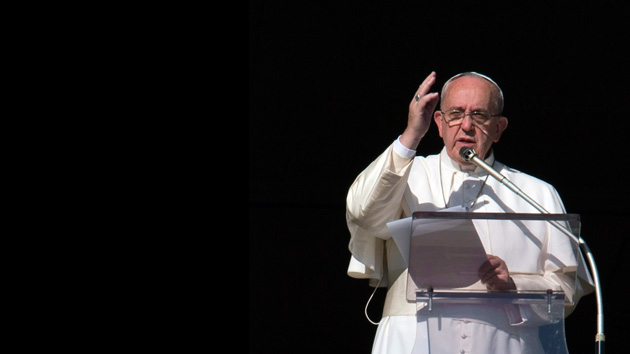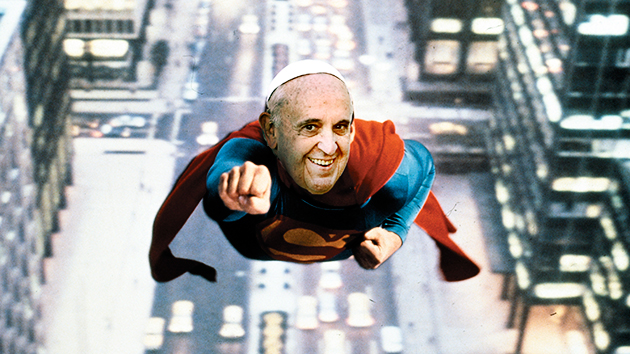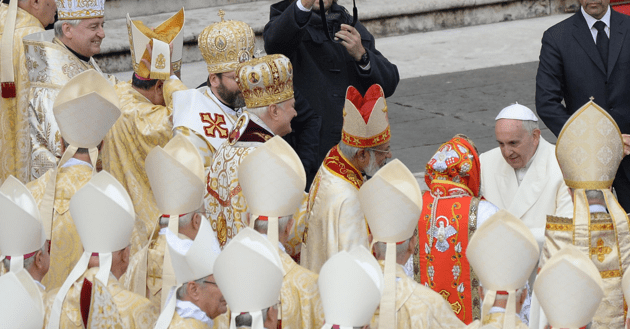
Pope Francis delivers a blessing during noon prayers.Alessandra Tarantino/AP
Pope Francis, the leader the Catholic Church, is closing out 2014 in his typically headline-grabbing fashion. He used a traditional Christmas address to issue a scathing takedown of the political squabbling that infects Vatican bureaucracy, and he was also credited as a key backroom player in the thawing of US-Cuba relations.
Next on his list? Climate change.
Over the weekend, the Guardian reported that the pope will issue the first-ever comprehensive set of Vatican teachings on climate change, in the form of an encyclical—or “papal letter”—sent to churches worldwide. He will also personally lobby for climate action action in a series of high profile meetings ahead of the all-important UN global warming negotiations in Paris next year. From the Guardian:
Following a visit in March to Tacloban, the Philippine city devastated…by typhoon Haiyan, the pope will publish a rare encyclical on climate change and human ecology. Urging all Catholics to take action on moral and scientific grounds, the document will be sent to the world’s 5,000 Catholic bishops and 400,000 priests, who will distribute it to parishioners. According to Vatican insiders, Francis will meet other faith leaders and lobby politicians at the general assembly in New York in September, when countries will sign up to new anti-poverty and environmental goals.
A papal letter “is among the highest levels of teaching authority for a pope,” said Dan Misleh, executive director of the Catholic Climate Covenant. These edicts “always make news, because they are rare and comprehensive,” he added.
Singling out climate change is also significant. “It is the first time ever an encyclical letter has been written just on the environment,” Misleh said. “The faithful, including bishops, and all of us who adhere to the Catholic faith, are supposed to read it and examine our own consciences.”
Mobilizing believers to embrace climate action could be a very big deal, given the sheer number of people who identify as Catholic in the US—around 75 million—he said. “If we had just a fraction of those acting on climate change, it would be bigger than the networks of some of the biggest environmental groups in the US,” he said. “That could help change the way we live our lives, and impact our views on public policy.”
The impact would be felt beyond Catholicism too, said Mary Evelyn Tucker, director of the Forum on Religion and Ecology at Yale University. She called the forthcoming letter “one of the most important documents on the moral implications of what we are doing to our planet.” In particular, Tucker said, the document “will contain compelling teachings on environmental justice for the poor and those who are victims of climate disruption around the world.”
But would America’s Catholics welcome climate advocacy from the pope? Recent polling by the Public Religion Research Institute and the American Academy of Religion suggests that many would.
The survey asks a series of questions about the environment and religion in an attempt to discern how faith impacts our thinking on science, current events, and policy. The biggest takeaway when it was released in November was that nearly half of Americans say natural disasters are a sign of “the end times,” as described in the Bible. But there are other, more detailed findings about individual religions, too. The researchers break down the results by religious and racial group: White evangelical Protestants, white mainline Protestants, black Protestants, white Catholics, Hispanic Catholics, Jewish Americans, other non-Christians, and “religiously unaffiliated.”
And indeed, most Catholics seem to agree with the pope that climate change poses a serious threat. Here are some of the survey’s key findings:
- Nearly three-quarters of Hispanic Catholics surveyed agree that climate change constitutes a “crisis” or a “major problem.” The same is true for a majority (53 percent) of white Catholic respondents. Of the groups surveyed, Jews are the most concerned about climate change, with nearly 80 percent calling it a “crisis” or a “major problem.” On the other end of the spectrum, a majority (54 percent) of white evangelicals see climate change as only a minor problem, or not a problem at all.
- Nearly a quarter (24 percent) of Catholics surveyed said climate change is the “most pressing” environmental issue we face. That’s more than white mainline Protestants and evangelicals, but less than black Protestants or those who are unaffiliated with a religion.
- The pope’s climate message is likely to resonate with what’s happening already at a grassroots level in churches, as least in Hispanic communities, according to the survey. Seven-in-10 Hispanic Catholics say their clergy discus climate change often (22 percent) or sometimes (48 percent). Hispanic Catholics are also more likely than any other group surveyed to say their congregation has sponsored climate change-related activities, like group discussions or educational programs on the topic.
- Interestingly, there’s wide agreement that acting now on climate change will matter economically. Majorities of all groups surveyed—including 69 percent of Hispanic Catholics and 63 percent of white Catholics—agree that dealing with global warming now will help prevent economic calamities in the future.
The pope’s climate plans follow a call by prominent Catholic bishops to end the use of fossil fuels and secure a global agreement to fight climate change. “As the church, we see and feel an obligation for us to protect creation and to challenge the misuse of nature,” declared one of the statement’s authors, Monsignor Salvador Piñeiro García-Calderón, the Archbishop of Ayacucho, during the recent climate conference in Lima, Peru. “We felt this joint statement had to come now because Lima is a milestone on the way to Paris, and Paris has to deliver a binding agreement.”
It’s also not the first time Pope Francis has advocated tough climate action. Ahead of the Lima meeting, the pontiff wrote a letter to Manuel Pulgar-Vidal, Peru’s minister of the environment and the host of the meeting, to urge action. “The time to find global solutions is running out,” wrote the Pope. “We can find adequate solutions only if we act together and unanimously.”
Climate change, he added, will “affect all of humanity, especially the poorest and future generations. What’s more, it represents a serious ethical and moral responsibility.”













